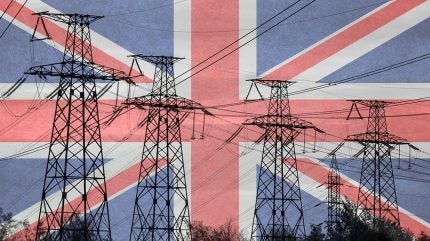
A recent survey by GlobalData highlighted industry’s desire for the new UK Government to improve grids, above all other energy transition priorities.
The survey, circulated to members of the energy industry ahead of the UK general election held on 4 July, gauged the industry’s take on the implications of a new government on the country’s energy transition, including expected and desired outcomes.
Grids and renewables over electrification and fossil fuel phase-out
When asked about hopes for the new Parliament’s priorities around the transition, participants ranked modernising and expanding grids as the top priority, reflecting the urgent need to improve connectivity and stabilise supply across the nation.
“The survey results indicate a growing awareness of the UK power sector’s current infrastructural bottleneck acting as a barrier to decarbonisation, with a strong emphasis on grid modernisation and connectivity within responses,” says Francesca Gregory, senior energy transition analyst at GlobalData.
“The survey response follows ESO (electricity system operator) estimates earlier this year that approximately £112bn [$144.67bn] would be required between 2024 and 2035 to reach the UK 2050 net-zero target, which Labour has committed to maintain.”
In second place was a call to ramp up the deployment of renewables and other sustainable energy sources, aligning with GlobalData’s forecast that the UK will make annual new investments of $14.1bn and $2bn for wind and solar, respectively, by 2030.
Ranked third was the increase of energy efficiency measures such as electrification and digitalisation. Phasing out fossil fuels and emissions was ranked last, signifying that industry views the issue with lower immediate urgency despite its long-term importance.
Fossil fuels to stir controversy
When it comes to potential conflicts within Parliament, the responses indicated that industry expects phasing out fossil fuels and decreasing emissions to likely be the most contentious aspect of the UK’s energy transition.
This is not surprising given the deep-rooted economic and social implications of the phase-out.
“Respondents expect the phase-out of fossil fuels to remain the most contentious topic, with Labour’s plan to halt the issue of new drilling licences for oil and gas production in the North Sea standing in stark contrast to the Conservative’s 2023 decision to continue issuing new licences, which cast serious doubt surrounding the UK’s commitment to its net-zero target,” Gregory explains.
Modernising and expanding grids, ranked second, is also expected to stir debate, given the significant investment and policy overhaul the agenda requires.
Energy efficiency measures and the expansion of renewable energy were seen as least controversial, signifying a broader consensus on their benefits and implementation strategies.
Industry’s expectation was confirmed through the solidarity in supporting renewables in the manifestos of all four major parties – Labour, Conservatives, Liberal Democrats and Greens – in this year’s election.
Optimistic about the future
Respondents were generally optimistic about the future of the UK’s energy transition. A substantial 60% said they believe that, regardless of which party wins the next election, the energy transition will receive more attention than it currently does. Only 10% were pessimistic, believing that the energy transition will be deprioritised regardless of the election outcome.
However, 30% responded that they believe the election results will significantly impact the level of prioritisation, indicating uncertainty about some of the political parties’ commitment to the cause.
However, this uncertainty is likely to have been addressed by the election outcome.
When asked which party is most likely to accelerate the UK’s energy transition, 70% of respondents identified Labour. The Liberal Democrats ranked second, with 20% support, while only 10% believed the Conservatives would lead effectively in this area, signalling a clear perception that left-leaning parties are more aligned with energy transition goals.
Given Labour’s victory in this year’s election, paired with the Liberal Democrats taking a record number of seats, it is likely that industry feels reassured that the country’s transition is in better hands than before.
Gregory adds: “Survey respondents indicated strong support for Labour when assessing the ability of each party to accelerate the UK’s decarbonisation and progress towards net zero. The party plans to reinstate the UK as a clean energy front-runner by capitalising on the country’s compatibility with offshore wind energy generation.
“However, the party’s ability to deliver this, while contending with budgetary constraints, and its other promise not to increase the taxes of ordinary working people, remains to be seen.”



